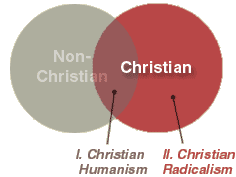
|

|
The answer, I think, is to Humanize religion. I am not naive enough to think that the problem of radicalized religion is ever going to go away. Religious belief is here with us to stay and as long as it is, there will be people who take it way too literally and who will use it to justify their angry and hate filled ideas. All religions suffer from this problem. No group is immune to it. And as my dad always says, no group corners the market in stupidity. It’s a problem that we would have to deal with religion or without.
So, how do we combat that? Well, I’m obviously biased, but I think Humanism is the answer. Humanism encourages us to think compassionately about others. It encourages us to respect people as the individuals they are, even if we don’t agree with them. It encourages us to be ethical, moral and responsible people. It encourages us to make the world a better place for everyone, and not just for a select few. And most importantly, it doesn’t advocate violence as a way to solve routine differences of opinion.
As someone whose
Here’s why. Humanists and Humanistically inclined people are good people. Regardless of what you believe or don’t believe, if you are a Humanist or Humanistically inclined, I’m probably going to like you. If you aren’t, I’m going to want to stay away from you. The Atheist movement is starting to deal with this as it grows and it becomes obvious that not all atheists are Humanists. Some atheists are pretty horrid. Religion needs to come to the same conclusion. Not all people of faith approach their faith Humanistically. Those that don’t, bring something really horrid to their faith.
What encouraging the Humanizing of religion will do is to give the good people of faith a framework with which they can distinguish themselves from the bad people of faith. What distinguishes the good from the bad isn’t what faith someone follows or doesn’t. It is whether the individual’s approach is Humanistic or not.
 Once
we recognize that, and help good people of faith recognize that, we
can start labeling the negative approaches to life for what they are.
Negative approaches to life. And, it will become easier to encourage
the more positive approach to life because it will have a name.
Once
we recognize that, and help good people of faith recognize that, we
can start labeling the negative approaches to life for what they are.
Negative approaches to life. And, it will become easier to encourage
the more positive approach to life because it will have a name. Just as it is important to distinguish Atheism from Humanism (even though both approaches lack belief), I think it is important to distinguish between Humanistic Christianity and Christianity that isn’t Humanistic. The same goes for Humanistic Judaism, Humanistic Islam, Humanistic Hinduism or Humanistic whatever.
If we can do that, then we can empower the Humanistic people in various faith traditions to stand up to the more negative approaches people of their faith sometimes take. They can refute the claim that the negative approach to faith is the better approach. It isn’t. The Humanistic approach to faith is the better approach.
The big problem we have had after Sept 11th is that we still haven’t found a way to criticize the negative approaches to faith without condemning the positive approaches to faith. In this specific case, we weren’t able to adequately condemn the hijacker’s version of Islam because we weren’t able to separate it out from other more Humanistic forms of Islam. This meant that Humanistically inclined Muslims were unable to adequately and aggressively condemn the actions taken by the hijackers because they had to simultaneously condemn the actions of the hijackers while defending the religious beliefs of the hijackers.
But imagine if instead of the problem being that the hijackers were Muslims, the problem was that they didn’t approach their faith Humanistically. That would have provided everyone, including Humanistically inclined Muslims a framework in which we could have all roundly condemned the hijackers and their handlers without having to defend faith at all. It wouldn’t have been about belief; it would have been about their approach to their beliefs. And the problem was that they didn’t approach their faith Humanistically.
Long story short, we can’t encourage people to reject negative approaches to faith unless we give them a positive alternative. Which means, we need to be actively work with Humanistic people of faith to encourage them to learn about Humanism. We need to help them understand that the good they seen in their religion is actually Humanistic in origin. We need to show them how approaching their faith Humanistically will not only help them to be better people, but that it can help them push back against the negative approaches people take in the name of their faith. By Humanizing religion, we can help demonize those approaches that aren’t. I simply don’t see how we can avoid a repeat of 9/11 if we don’t.
End Note: Humanism is a non-religious philosophy - meaning it is without belief in the supernatural. If you are a believer, but otherwise agree with Humanism’s approach - you are considered to be Humanistically inclined. This distinction is important because there is a need for a distinct label for this non-religious approach to morality and ethics. People who are committed to being ethical but who are not religious have no other label with which to define themselves. Please respect that and if you are of faith, recognize that you approach your faith Humanistically, which will indicate clearly that you don’t reject supernatural beliefs as the Humanists do.
Jen Hancock
www.sumogirl.com
